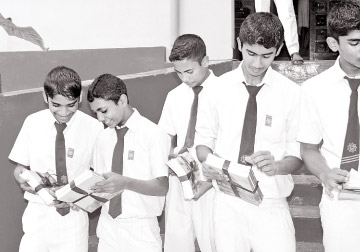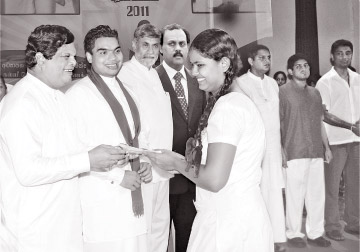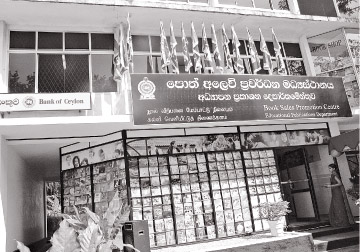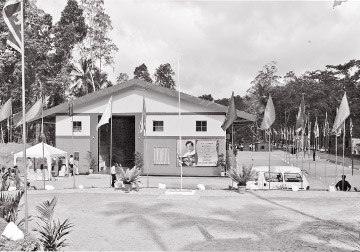|
Educational Publications Dept:
Providing quality textbooks a gigantic task
By Ranil WIJAYAPALA
Providing guidance for the more than 4.1 million student population
during their school career and quality textbooks to receive their free
education at more than 10,000 government schools and Pirivenas is a
gigantic tasks successive governments have undertaken since 1980.
|

W.M.N.J. Pushpakumara |
 The process has now turned into a massive operation as the horizons
to education keeps on expanding with the unending changes that take
place in the education system locally and internationally. The process has now turned into a massive operation as the horizons
to education keeps on expanding with the unending changes that take
place in the education system locally and internationally.
It has become the prime responsibility of the Educational
Publications Department (EPD) under the Ministry of Education to ensure
that the 4,178,548 students being educated at 9,704 government schools,
75 private schools, 25 specialised schools, and 722 Pirivenas receive
their textbooks at the beginning of each year.
The EPD has already fulfilled this task by distributing 37 million
school textbooks under 433 categories before the year end school
vacation in 2010.
The national program to distribute school textbooks for 2011 was held
at Vivekananda Vidyalaya, Trincomalee in December.
It is not only the conventional task of printing and distributing
school textbooks, the EPD under initiatives taken by the Education
Minister Bandula Gunawardena has also taken steps to expand its services
to reach the public, within the past few months.
According to the Commissioner General of the EPD, W.M.N.J.
Pushpakumara the department has gone a few steps further to reach the
public by introducing promotional outlets at five locations for their
convenience.
“Even the teachers’ guides are now available at our outlet. That is
what education means. We should not confine it to a section only”,
Pushpakumara said.
The EPD has outlets at Meepe, Maharagama (National Institute of
Education), and Jaffna apart from the two outlets at Olcott Mawatha,
Colombo and at Isurupaya, Battaramulla.
|

The Education Minister at a ceremony to distribute school
textbooks |
Another outlet is to be opened at the Colombo Fort Railway Station on
January 18.
“We expect to open 18 more outlets countrywide and at major railway
stations by the end of this year”, Pushpakumara said.
He said the opening of the Jaffna outlet was very important for the
people in Jaffna to buy Tamil publications published by the department
easily.
The biggest attraction is the question and answer books of past
question papers of the year five scholarship, G.C.E.(O/L) and (A/L)
examinations.
“We are doing this along with the Examinations Department”, he said.
The department has also focused attention on issuing better quality
textbooks.
“We have appointed committees to revise existing textbooks, to change
content quality by appointing new panels to review the books and also to
improve the external quality with the improvement of tolerance,
brightness, opacity of the paper used for the textbooks”, he said.
To improve content quality, panels have been appointed for each
textbook. For instance for the subject Health those who know the subject
and doctors who are conversant in the subject are appointed to the
committee to write the book.
|

EPD outlets |
“After the panel completes the book a Sinhalese language expert will
go through the book to check for language a accuracy,” he said.
The department this year published 433 textbooks in three languages.
“We have committees for each language and they have a better
coordination to check whether the books are in order”, he added.
Once the syllabuses are changed the National Institute of Education
appoints an editorial panel comprising university professors, teachers,
instructors, NIE officials and classroom teachers to edit the books.
“It takes at least three to seven months to complete a textbook as it
should go through a long process to see that a quality textbook is
issued to students”, he added.
The textbook goes to print after the editorial panel is satisfied
with it.
Even at printing the EPD makes sure that quality in content and
outward appearance is maintained by random checks on the printed books
and comparing them with their originals.
“We always check printing quality. We have imported machines and
laboratory equipment to check the pre-prints of the textbooks. If
printers do not maintain quality, the books are rejected.
Instead of making the effort to maintain quality of textbooks many
people used to complain about errors in them.
 “The problematic situation was created when authorities offered the
writing of textbooks on the multiple book option for Grades six and 10
to private contractors in 2006”, he said. “The problematic situation was created when authorities offered the
writing of textbooks on the multiple book option for Grades six and 10
to private contractors in 2006”, he said.
Those companies handed over the contract to individuals to write the
textbook and then handed over that book to the EPD to be printed.
“There were errors in those textbooks. Steps were taken to rectify
those errors to a certain extent and now we have decided to rewrite
those books”.
Steps have been taken to appoint committees at school level for each
subject.
“These committees can point out any error in the textbook.
Suggestions are put onto another committee for rectification. Every
thing possible has been done to correct all mistakes in textbooks”, he
said.
The department has also taken initiatives to lessen the weight of
school textbooks this year.
“We have identified 70 textbooks that are overweight for students.
These textbooks were divided into two and printed as two books to lessen
the burden on the students who take them everyday to school”.
“We issue both books together but students only need to bring the
required section on a daily basis.
To promote the better use of school textbooks the EPD has initiated a
program to award certificates to three students from each class who use
their books well to be handed over to the students coming in to that
grade next.
“Many students try to use the textbooks cleanly to receive this
certificate. Due to this situation we have been able to save a large
amount of money as the reuse of school textbooks has increased from 7
percent to 23 percent”, he added.
Construction of the new stores complex at Pitipana, Homagama on eight
acres of land enables the department to save a large amount of money
paid as rent for storage.
“With the completion of the Pitipana stores complex we can save Rs.
1.7 million per month. We can already save Rs. 400,000 with the
completion of the first stage of the project”, he added.
The introduction of the hazard free school bag was also initiated by
the EPD along with the Health Ministry.
“Research on a selected 2000 students was carried out by the EPD and
the Health Ministry. The findings indicate that the school bags used by
students were not proper and doctors also highlighted this point.
“Now there is no question about the design of the bag. There is a
request from the parents to have a control price for the bag. The
Education Ministry cannot involve itself in this matter. It’s the
prerogative of the Trade Ministry”.
The role of the EPD is only an advisory role.
“The advisory panel has given its specifications to the bag
manufacturers. We gave them a badge and a registered number. If the
product is substandard we will cancel their registrations after
inspection”.
“What I need is to see only this bag in the market”.
According to the Commissioner General what happened in December was
that the demand for this bag became very high and the price went up. The
380 manufacturers registered with the EPD did not think that there would
be such a big demand for the bag.
What people think is that the bag should be given at a concessionary
rate as the government was involved in the matter.
“It is not compulsory that students use this bag”, he said.
“We are vigilant on the standard of the bag. We are going to launch a
program to monitor that quality bags flow to the market and whether
there should be improvements to the bag”, he said.
The Department also expects to conduct a survey to ascertain how many
students use the bag.
Many small scale bag manufacturers will benefit from this process.
Bag manufacturers can register with the department to supply these bags
free of charge.
Only those registered with the department can manufacture the bags
and parents who purchase them should inspect whether the bags have been
manufactured in the standard form. |

